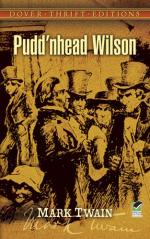She gathered up her baby once more; but when her eye fell upon its miserably short little gray tow-linen shirt and noted the contrast between its pauper shabbiness and her own volcanic eruption of infernal splendors, her mother-heart was touched, and she was ashamed.
“No, dolling mammy ain’t gwine to treat you so. De angels is gwine to ‘mire you jist as much as dey does yo’ mammy. Ain’t gwine to have ’em putt’n dey han’s up ‘fo’ dey eyes en sayin’ to David and Goliah en dem yuther prophets, ‘Dat chile is dress’ to indelicate fo’ dis place.’”
By this time she had stripped off the shirt. Now she clothed the naked little creature in one of Thomas `a Becket’s snowy, long baby gowns, with its bright blue bows and dainty flummery of ruffles.
“Dah—now you’s fixed.” She propped the child in a chair and stood off to inspect it. Straightway her eyes begun to widen with astonishment and admiration, and she clapped her hands and cried out, “Why, it do beat all! I never knowed you was so lovely. Marse Tommy ain’t a bit puttier—not a single bit.”
She stepped over and glanced at the other infant; she flung a glance back at her own; then one more at the heir of the house. Now a strange light dawned in her eyes, and in a moment she was lost in thought. She seemed in a trance; when she came out of it, she muttered, “When I ’uz a-washin’ ’em in de tub, yistiddy, he own pappy asked me which of ’em was his’n.”
She began to move around like one in a dream. She undressed Thomas `a Becket, stripping him of everything, and put the tow-linen shirt on him. She put his coral necklace on her own child’s neck. Then she placed the children side by side, and after earnest inspection she muttered:
“Now who would b’lieve clo’es could do de like o’ dat? Dog my cats if it ain’t all I kin do to tell t’ other fum which, let alone his pappy.”
She put her cub in Tommy’s elegant cradle and said:
“You’s young Marse Tom fum dis out, en I got to practice and git used to ‘memberin’ to call you dat, honey, or I’s gwine to make a mistake sometime en git us bofe into trouble. Dah—now you lay still en don’t fret no mo’, Marse Tom. Oh, thank de lord in heaven, you’s saved, you’s saved! Dey ain’t no man kin ever sell mammy’s po’ little honey down de river now!”
She put the heir of the house in her own child’s unpainted pine cradle, and said, contemplating its slumbering form uneasily:
“I’s sorry for you, honey; I’s sorry, God knows I is—but what kin I do, what could I do? Yo’ pappy would sell him to somebody, sometime, en den he’d go down de river, sho’, en I couldn’t, couldn’t, couldn’t stan’ it.”
She flung herself on her bed and began to think and toss, toss and think. By and by she sat suddenly upright, for a comforting thought had flown through her worried mind—
“’T ain’t no sin—white folks has done it! It ain’t no sin, glory to goodness it ain’t no sin! Dey’s done it—yes, en dey was de biggest quality in de whole bilin’, too—kings!"




